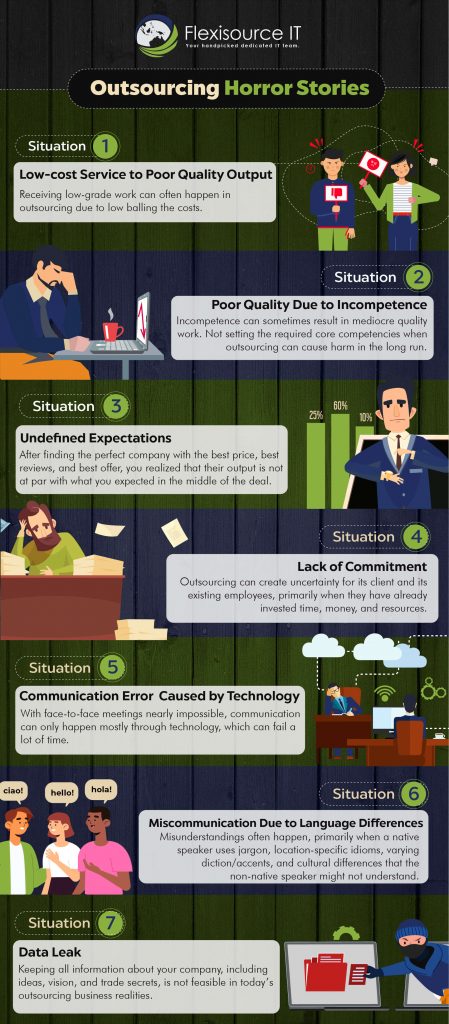As a business owner, you are probably looking for innovative ways to make sure your company is functioning and effective. And while not all methods necessarily work for everyone, outsourcing can offer a wide range of services to help you achieve your business goals. If you ever heard of outsourcing, either from a friend or colleague, you probably have considered availing it to aid the needs of your business.
However, you probably stumbled upon hundreds of horror stories on outsourcing.

So, if you ever want to try outsourcing but are too afraid to take the next step, here are some outsourcing situations that you would like to avoid and tips and advice to prevent these situations from happening. Remember, it takes good management of your outsourcing.
Table of Contents
1st Outsourcing Horror Story: Low-cost Service to Poor Quality Output
Receiving low-grade work can often happen in outsourcing due to low balling the costs.
Low prices do not necessarily mean the best deal. Always remember that you get what you pay for. Going for the lowest price can sometimes lead to disaster. Although not always, quality is generally associated with price. High-skilled and experienced professionals typically cost more because of their background, education, skills, and training. They have the right abilities to give you the best service.
If you get lucky, you can get quality work for a low price. But that is not always the case. So do not be afraid to pay a little extra to get the output you want.
How to avoid low-cost service to poor quality output:
To avoid shoddy quality work, you should not limit yourself to low-priced outsourcing services. Consider looking for other options and weigh the pros and cons. Try looking into the usual costs of this job in your country and compare it to the company’s price.
If you are trying to cut expenses, try researching if services on the ongoing projects are available offshore. There can be a dedicated staff that can give value for a lesser price.
2nd Horror Story: Poor Quality Due to Incompetence
Incompetence can sometimes result in mediocre quality work. Not setting the required core competencies when outsourcing can cause harm in the long run. Thus, overlooking incompetence during the contract process might affect the overall performance of your company.
When looking for a new employee, you are likely to screen through the resume before selecting the best candidate for an interview. You do not hire the first person to show up with promises to do the work.
Similarly, it is essential to screen the outsourcing company and its employees before signing a contract. If done correctly, outsourcing is beneficial for your business’ growth and ventures.
How to avoid poor quality due to incompetence:
To ensure that you will not hire an ineffectual outsourcing company, make sure to weed out your selection. Carefully research your prospects, keeping in mind the location and price. Always research about the company before contacting.
As much as possible, investigate reviews not only from customers but also their employees. Do not fall for their flamboyant advertisement.
A list of your company’s needs can help in selecting an outsourced company.
3rd Outsourcing Horror Story: Undefined Expectations
After finding the perfect company with the best price, best reviews, and best offer, you realized that their output is not at par with what you expected in the middle of the deal. Defined expectations are critical when contracting with outsourcing companies.
How to avoid undefined expectations:
It is essential to set expectations for both parties. When signing a contract, always discuss deadlines, quality, process, rules, and outlines. Having defined expectations can ensure that the agreement outlines what you need.
In addition, set clear definitions and expectations that allow outsourcing companies to meet or even exceed the standards you desire. If the company did not meet your expectations, the right contract would serve as extra protection to you and your company.
4th Horror Story: Lack of Commitment
Outsourcing can create uncertainty for its client and its existing employees, primarily when they have already invested time, money, and resources. While there is nothing to worry about most of the time, problems can arise in the long run.
Several outsourcing horror stories were shared, such as halfway through the development stage, the outsourcing company or remote team explained that they could not continue working on your project. Sometimes, the employee unexpectedly resigned.
How to avoid lack of commitment:
Outsourcing cannot always guarantee success, especially during the early pre-implementation stage. Employees come and go in companies, and turnovers are not always one hundred percent guarantees.
Make sure to identify the top 10 percent of essential employees due to their knowledge and skill base. Offer a specific retention strategy by providing competitive salaries, benefits, and growth. Remember, it is the people who do your business, so they need to be cared for.
When applicable, cooperate with the service provider and jointly develop unique approaches that limit staff turnover before and during the project period.
More about outsourcing:
Should You Outsource Your Web Design Projects?
Five Reasons Why Companies Offshore their Business
IT Outsourcing: What to consider when outsourcing IT?
What makes good outsourcing?
5th Outsourcing Horror Story: Communication Error Caused by Technology
The COVID-19 Pandemic has caused a lot of communication errors in businesses. With face-to-face meetings nearly impossible, communication can only happen mostly through technology, which can fail a lot of time.
Even before the pandemic, miscommunication due to technical glitches or mistakes can happen. Since employees today mostly communicate via email, phone, or messaging applications, errors at work can happen along with Tech glitches.
This communication fails can often cause quarrels between employers, employees, and clients, especially for businesses using outsourced services.
How to avoid communication error caused by technology:
Miscommunication is common in any business. To avoid misunderstandings, always remember that communication is a two-way process always and does involve verbal cues and non-verbal cues or ones that are not spoken at all.
Always ask for acknowledgment when messaging the other party to know if they have read your message or email. Follow up all verbal conversations with a written record to ensure stays on the same page throughout the process.
Frequent, consistent communication helps both parties stay aligned with expectations and allows for more transparency.
6th Horror Story: Miscommunication Due to Language Differences
Working with non-native English speakers can be challenging at times. Misunderstandings often happen, primarily when a native speaker uses jargon, location-specific idioms, varying diction/accents, and cultural differences that the non-native speaker might not understand.
It is vital to make sure that the company you outsource speaks English fluently. This is why outsourcing has become popular in English-speaking countries like the Philippines, where most employees have a diverse skill set and good English speakers with neutral accents. According to the British Council Philippines, English is one of the official languages in the Philippines spoken by more than 14 million Filipinos.
However, not all the skills you need are available in the Philippines and India. Thus, it can be challenging to find the perfect outsourcing company to match your needs.
How to avoid miscommunication due to language differences:
To avoid misunderstandings by having spoken and listening in the same junction.
If you are giving out tasks, you need to make sure that the other party understood the instruction. Try asking the other party to reiterate the instruction in their understanding. In addition, always ask if they have any questions or need clarification. Opening an avenue for feedback and questions can clear up any confusion on the process.
Keep the channels of communication open, as this will help both parties avoid unnecessary confusion and frustration.
7th Outsourcing Horror Story: Data Leak
Outsourcing can be risky when not done right. Keeping all information about your company, including ideas, vision, and trade secrets, is not feasible in today’s outsourcing business realities.
It is essential to have security measures and recovery plans to counter breaches if something goes wrong. The outsourced company will sell most of your valuable information to other companies or industries in some instances. According to the Ponemon Institute report, about 65% of companies who outsourced work to a vendor experienced a data breach, including consumer data. This will decrease your chances of creating the most worthwhile project you have been planning.
But this does not mean you should opt out of hiring an outsourcing company. All parties involved in outsourcing have a responsibility to protect the sensitive and confidential data entrusted to them.
How to avoid data leak:
When outsourcing to a vendor, it is essential to safeguard information. Always make sure to hold outsourcing companies the same security standards as your in-house employees. Require them to put in place a set of security protocols and procedures to monitor potential threats of an information breach.
Most importantly, ensure that your long-term contract covers these security protocols and procedures. In contrast, the vendor is legally obligated to fix any data breach (including notifying customers and paying a sum for any damages.
Lastly, try to run background checks on the vendor and its employees.
Ready to Outsource?
In summary, outsourcing services is risky and complex when dealing with the cost, system, and intricacy. The process can be meticulous and arduous. A lot of potential risks can occur at any time.
But if you know what you are doing, outsourcing can be beneficial to your company. Get in touch with Flexisource IT today.
Pamela is a full-time content writer and a lifelong Philomath. Her previous experience as a research analyst made her passionate about traveling the world and understanding how it works. During her day off, you can often find her indoors, writing stories or oil painting.


